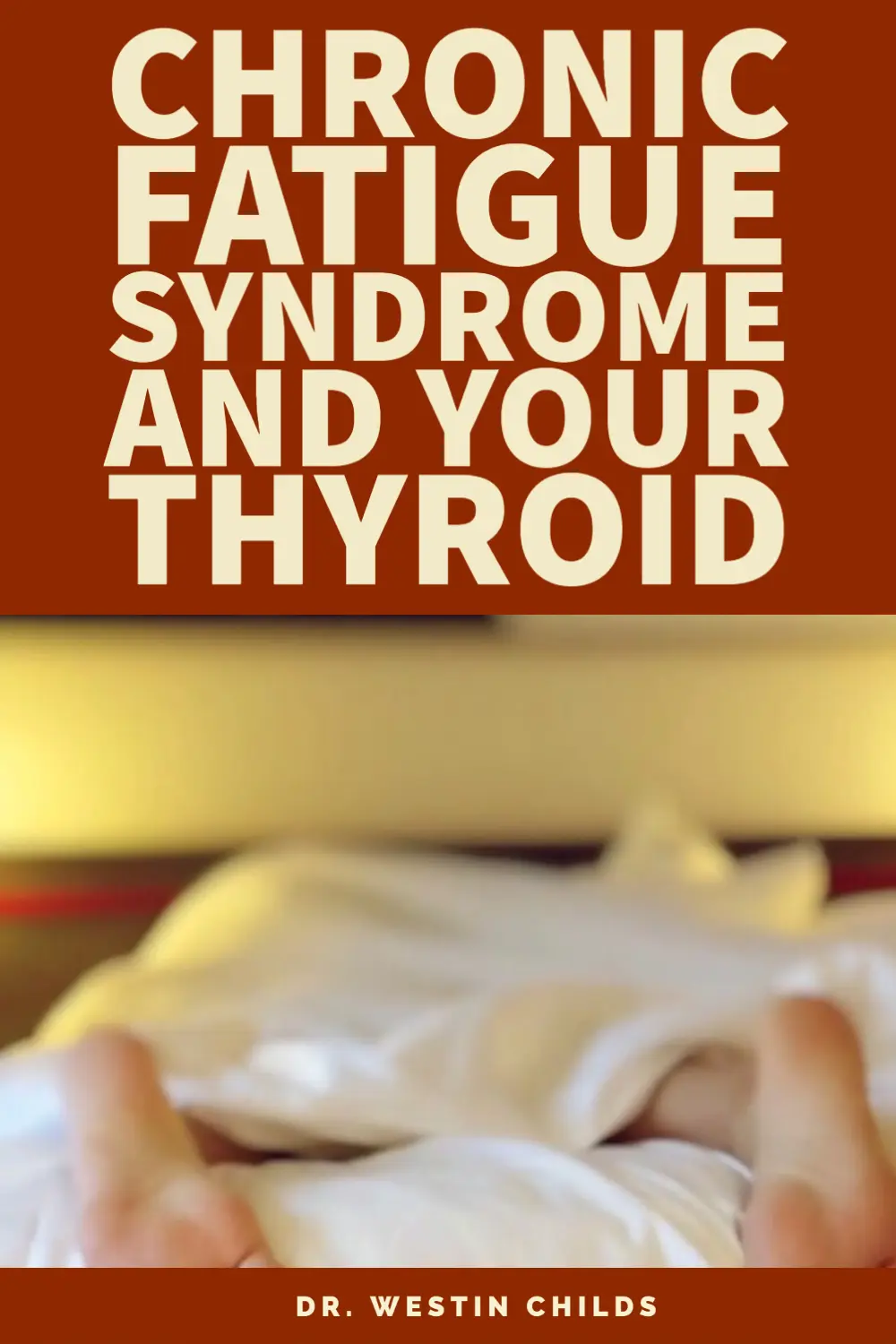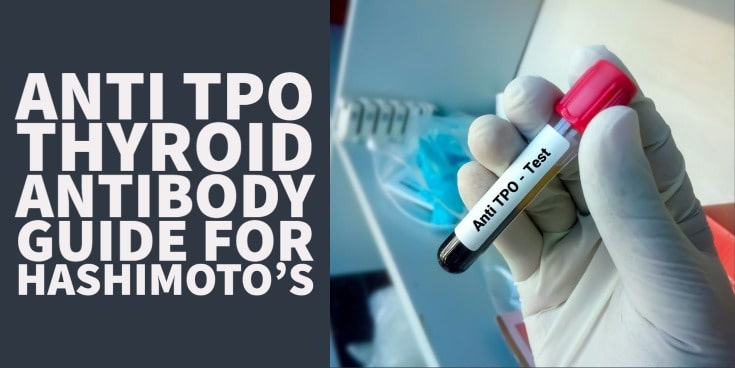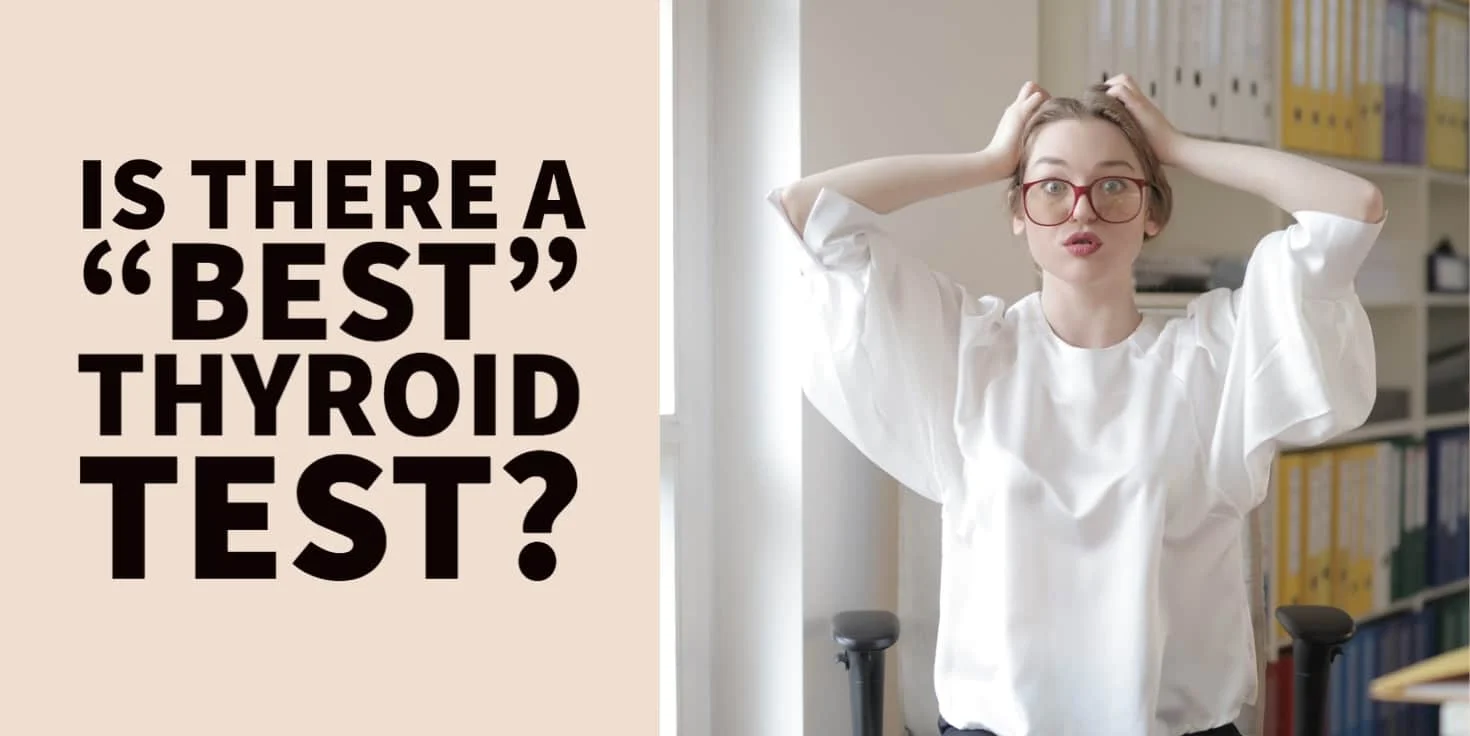When Traditional Thyroid Testing and Treatment Fails
Did you know that some people who have chronic fatigue syndrome have some very interesting thyroid lab tests?
These lab tests may shed light on what is happening to cause chronic fatigue syndrome, at least in some individuals.
Why is this important?
Because the thyroid lab findings in these patients are not the “typical” way that thyroid disease presents.
In addition, it may be that the thyroid dysfunction found in these patients is a potential treatment option and one way to actually treat and manage chronic fatigue syndrome.
To highlight these facts I am going to be pulling information from a new clinical study (done in 2018) which highlights the connection between chronic fatigue syndrome and low T3.
I will be using this study to help elaborate (1) on what could be causing chronic fatigue syndrome or CFS for certain individuals.
I’ve long held the view that certain cases of hypothyroidism can actually result in a chronic fatigue-like syndrome as well as a fibromyalgia-like syndrome.
And the key here isn’t that the low thyroid state results in these syndromes but more so that these syndromes can be TREATED and MANAGED with the right thyroid medication.
So if you are someone who has chronic fatigue syndrome then this article is for you!
You may also find this article helpful if you have the symptoms of chronic fatigue syndrome AND known (or suspected) low thyroid function.
Let’s dive in…
Thyroid Causes Fatigue & Low Energy
The first thing you should know is that low thyroid function causes fatigue.
But the fatigue caused by hypothyroidism is typically not sufficient enough to be labeled chronic fatigue syndrome.
Chronic fatigue syndrome is typically much worse, doesn’t really improve with most therapies, and renders people who have it unable to perform even daily tasks.
The fatigue associated with hypothyroidism tends to be moderate in that it still impacts your daily life but you can still function.
But, like anything, the fatigue associated with hypothyroidism exists on a spectrum.
And on this spectrum, there will always be people who are hit harder than others.
In fact, there are many people with hypothyroidism who have mild fatigue but other symptoms on the extreme end.
On the flip side, there are also people who present PRIMARILY with fatigue and other mild symptoms.
It is these people that I want to focus on.
There seems to be some subgroup of thyroid patients who get harder on the fatigue spectrum than others.
And these people can often present with symptoms that match those found in chronic fatigue syndrome.
Does this mean that they have chronic fatigue syndrome and not hypothyroidism?
I don’t think so.
It’s much more likely that they have chronic fatigue syndrome caused BY hypothyroidism.
A Hidden Cause of Chronic Fatigue Syndrome?
Chronic fatigue syndrome is known to be a very difficult-to-treat condition, as pretty much anyone with the disease will tell you.
The problem with managing chronic fatigue syndrome is that no one really knows what causes it.
In fact, multiple different causes (2) have been identified but there isn’t necessarily a unifying factor among these various causes.
The study we are evaluating today took into account the multiple causes of chronic fatigue syndrome and tested around 100 patients for the following:
- Thyroid function
- Inflammation
- Gut wall integrity
- Nutrient status
They found that of about 100 chronic fatigue syndrome patients, most of these patients had similar thyroid lab studies.
While almost all of these patients had abnormal thyroid lab tests (low thyroid function or hypothyroidism) they found a correlation between those with inflammation and low T3.
This information suggests that certain individuals with chronic fatigue syndrome experience a set of thyroid lab tests in line with a condition known as non-thyroidal illness syndrome or NTIS.
I’ve talked about the connection between NTIS and other conditions such as mold exposure in articles such as this.
But what you need to know here is that most doctors consider this abnormal thyroid lab pattern to be normal.
The problem with this logic is that many patients who have NTIS lab patterns actually improve with thyroid hormone replacement!
They do not, however, improve on conventional thyroid hormone replacement medications such as levothyroxine and Synthroid.
Instead, they often need to use T3 thyroid hormone medications such as Cytomel or liothyronine.
And these medications are just not commonly prescribed.
This leaves many patients suffering from chronic fatigue syndrome secondary to thyroid conditions, never getting appropriate treatment.
Thus the reason for this article! To explain the connection and talk about new treatments for this condition.
The Low T3 Connection
What’s the connection between chronic fatigue syndrome and thyroid function?
It has to do with a few important findings.
The first is that those people who have low-grade chronic inflammation tend to experience thyroid dysfunction.
But the dysfunction that they experience is NOT typical of standard hypothyroidism.
Most people who have hypothyroidism or low thyroid function present with a high TSH and normal to low free thyroid hormone levels (these aren’t often tested by doctors but if you do get them tested you would find that they are low or normal).
But people who have chronic fatigue syndrome, according to this study, didn’t have a high TSH but exhibited a different set of thyroid lab abnormalities.
These patients were found to have LOW T3 and HIGH reverse T3.
If you know a little bit about thyroid function, or if you’ve been reading my blog, you know that these lab tests are probably the two most important thyroid lab tests to look at.
But, unfortunately, they are hardly ever ordered by most doctors!
The researchers in this study speculated that the thyroid plays an important role in regulating energy levels by virtue of its impact on cellular tissues.

What you need to understand is that your thyroid drives energy production in your cells.
If you don’t have enough T3 thyroid hormone to interact with your cells you may enter what is known as a hypometabolic state (3).
A hypometabolic state is just a state of low energy production, depressed metabolic function, and decreased mitochondrial energy production.
The net result is a decrease in total energy production and, therefore, fatigue.
Pretty straightforward as long as you lose all of the medical jargon!
It’s important to note that not EVERY patient with chronic fatigue syndrome had these abnormal thyroid lab tests.
In fact, only about 16 of the 100 or so patients had them.
The patients who had low T3 levels were also the ones who had high levels of inflammation as tested by hs-CRP which is a test used to evaluate for inflammation.
So we can conclude that high levels of inflammation in certain patients result in low thyroid function, low t3 levels, and high reverse T3 levels.
And these patients represent only a subgroup of ALL chronic fatigue syndrome patients.
This is why I stated earlier that certain people exhibit a chronic fatigue-like syndrome and perhaps not a true chronic fatigue syndrome.
I personally believe that many patients diagnosed with chronic fatigue syndrome actually have low thyroid function masquerading as chronic fatigue syndrome.
But the key here is that these patients CAN be treated and their fatigue CAN resolve… at least with the right treatment.
Treating CFS with T3 Thyroid Medication
The study we are evaluating today didn’t actually go into treating chronic fatigue syndrome due to thyroid dysfunction but I still think it’s important to touch on.
The study merely showed that there seems to be a connection between low T3, chronic fatigue syndrome, and inflammation in people who have chronic fatigue syndrome.
This can be easily explained.
But what isn’t explained is how to actually treat the problem.
And here is where I am going to draw from my own personal experience treating patients with chronic fatigue syndrome using T3 thyroid hormone.
So here’s one big problem with hypothyroidism and why many people who take thyroid hormones don’t often feel better:
It has to do with the fact that they are taking the wrong thyroid medication.
The most commonly prescribed thyroid medications (levothyroxine and Synthroid) only contain T4 thyroid hormone.
But we know from studies like this one, and MANY others by the way, that it’s possible to take Synthroid and levothyroxine and not convert it to T3 (the active thyroid hormone).
This occurs due to problems with thyroid conversion.
Here’s where things get interesting…
You can take all of the levothyroxine and Synthroid that you want (even to the point that it suppresses the TSH) but if your body isn’t converting it to T3 then you simply won’t feel better.
And this problem is occurring more than people probably realize.
One of the most common inhibitors of T4 to T3 conversion is inflammation.
This makes perfect sense as the researchers in this study found that those people who have high levels of hs-CRP (a marker of inflammation) had LOW levels of T3 and high levels of reverse T3.
This is the exact lab pattern we would expect if someone wasn’t converting T4 into T3.
Instead of taking that T4 and converting it to T3, we would see a buildup of T4, a reduction in free T3, and an elevation in reverse T3.
So it really doesn’t matter how much T4 you are taking if your body isn’t converting it.
This is where T3 thyroid medications such as Cytomel and liothyronine come into play.
These medications provide your body DIRECTLY with T3 thyroid hormone and bypass the need for thyroid conversion and the need for T4.
And, in my experience, this is exactly what patients with chronic fatigue syndrome need.
They tend to benefit greatly by providing the body with that T3 which results in immediate energy production at the cellular level.
Final Thoughts
Why does this matter to you?
It’s important for you to understand that chronic fatigue syndrome can be caused by MULTIPLE different conditions and problems.
But one of those problems may be related to your thyroid function.
And if it is related to your thyroid function then it CAN be treated.
But you may never know if this is the case unless you get tested properly.
And most doctors are not likely to start ordering the tests which are necessary to figure it out.
If you have chronic fatigue syndrome (known or suspected) then it would be a great idea for you to ask your doctor to order a complete thyroid lab panel which includes the following:
- TSH
- Free T3
- Free T4
- Reverse T3
- hs-CRP
If you can get these tests ordered then you can figure out if your chronic fatigue syndrome is actually low thyroid function.
If this is the case then you CAN get treatment and most likely completely recover.
My experience suggests that most people with chronic fatigue syndrome (provided it’s due to low thyroid function) will see significant improvement with the use of T3 thyroid hormone.
In fact, most people with chronic fatigue syndrome in general still benefit at least a little bit from the use of T3 thyroid hormone.
This thyroid hormone gets directly into your cells, bypasses thyroid conversion, and turns on your cells to produce more energy and ATP.
Also, don’t be afraid to print out this study and bring it with you to your next doctor’s appointment!
Doctors tend to respond well to medical research and this research is still very new (this study was done in 2018).
But now I want to hear from you:
Do you have chronic fatigue syndrome?
Do you ALSO have thyroid dysfunction or hypothyroidism?
Have you had your free T3 levels or reverse T3 levels tested?
If so, what were your results?
Leave your questions or comments below!









Help!
I had a partial thyroidectomy in 2012, at that time my MD in Pittsburgh had me taking cytomel it was heaven. Fast forward I live in Florida and cannot get an endocrinologist to listen to me. I am on synthroid and gaining weight. What does one do!!!!
Hi Laurie,
Probably best to find a new doctor who is willing to prescribe T3 again.
Thank you for your generous heart!
First I thank you from every inch of my heart Dr Childs for publishing so much detailed info online! I should have a degree now after reading it all! lol I told my doctor to go to restartmed.com and educate himself so he could actually start helping his patients. He got a new practitioner right from school and she was familiar with your site already! After 17 years of being on Levothyroxine (horrible, useless stuff!) she transitioned me from 125mcg of Levo down and started with 10 mcg of Liothyronine at same time! WOW! What a HUGE difference! I’m still fighting extreme food sensitivities though that cause mega inflammation that results in heavy fatigue. I actually dose off sitting at my computer working, having a conversation with hubby, and am so drowsy I can’t concentrate. Sometimes worse than others. My weight went up as well. My numbers show high but I suspect they aren’t reading the tests right. I’ve been off the Levo for about 3 months and still on 10mcg Liothyronine. I’m taking all the supplements you recommend as well. I get bad headaches and feel like my brain is baking at times. There is a piece of this puzzle still missing for me I think. I’m rereading everything here on your site again to see what I’ve missed. Thank you again for publishing it all here for us!
I have been on T4 only, NDT, and T4/T3. I have 10+ on CRP and Prior to adding T3 my RT3 was 23. Now I am on 125mg of Levo and 10mg am and 5mg at 2 pm of Liothyroxine. I have been diagnosed with hypothyroidism and hypopitituitary and fibromyalgia. I still feel extreme fatigue. Wondering your thoughts on T3 only treatment? I know I probably need more T3, but I am curious about T3 only with my diagnosis’s.
Thankyou for your information i do take your supplements and have ordered your your glandular one as well would t3 help me i have normal t4 low reverse t3 low t3 thankyou
Hi Vicki,
It sounds like you are on the right track!
Is there a way to get T3 without rx? I’ve been trying to get a doctor to work with me for almost 20 years. Its just exhausting all the way around. Tired of fighting it. Do you do telemedicine?
Hi Lou,
That is correct. You can only get T3 medication from a prescription but you can naturally increase T3 levels through a variety of ways.
Hello
I am interested in your Glucoslow but am wondering what effect it would have on someone with Gastroparesis who is supposed to be on a low fiber diet
Thank you
Hi Sandy,
You could still use it in that setting but you’d only want to use half of the recommended dose (3 capsules) instead of the full dose.
Hello , I am on 240mcg of Armour thyroid much better than synthetic hormones but I’m still extremely tired and can’t budge my weight . My weight is definitely not due to over eating if anything I dont eat enough. My thyroid function is barely existent so I think my conversion is not converting at all. Please help
Thank you so much. I have got alot of my clients who are personal trainers and nutritionists onto your page as your education on thyroid can benefit many
Very interesting article thanks for your work in this area
Dear Dr Childs,
your meal plan never arrives in my mail box, although I tried it several times, maybe you could send it to me directly. Many thanks
Joanna
About how much T3 does a person generate on a daily basis to sustain all metabolic processes? I’m asking about a person with no hypothyroidism.
are the thyroid panel levels you are referring to taken while on meds or should the meds be cleared out first?
Hi
I need some advice.
Your article is very interesting which I have read all of it.
Firstly I have M.E (CFS) since age 8 and I’m now 30.
I also suffer with Hypothyroidism since May 2012.
I’m on 75mg levothyroxine.
My recent blood results are…
TSH 1.30
Free T3 4.3
Free T4 21.9
They are all in range though my T3 is low and T4 is high.
Haven’t been able to get my reverse T3 done.
My thyroglobulin auto antibodies is 0.0
My anti thyroid peroxidase is 9.
I’m feeling totally exhausted and not a lot of energy.
I’m constantly sweating.
Been told that T3 Medication is not funded under NHS plus been told I don’t fit the criteria of T3 yet been told on thyroid groups on Facebook that I have a conversion problem.
What would you suggest?
I know I need T3 but nobody is listening to how I’m feeling.
How do I get my Endo to read this and what testing should he be doing other than TSH? I am on a T3 only regime (total of 30 mcg per day). But still fatigue, some depression from being so tired all the time, no sex drive, brain fog, sluggish metabolic, etc. I am not overweight but my weight has gone from 100-115 over the last 4 years since cancer. I eat very little and walk 5 miles per day.
Can I take more than 30 mcg per day safely? I did have head and neck cancer. Radiation destroyed my thyroid. Should I be looking at damage to my hypothalamus and or pituitary?
Hi Dr. Child’s ! Your articles are so very interesting and informative! I really believe that I may have CFS. I have a total thyroid removal in 2014 and I have not been balanced on thyroid meds yet. I have tried natural thyroid meds, Armour but could not tolerate it and it actually created palpitations now for which I take a beta-blocker because I can feel the palpitations. I also have severe sleep apnea and can’t get a mask to work for me. This is a short senecio of my problems but, I do know from my rheumatologist that I have an elevated CRP level and I have a lot of inflammation in my body. I also don’t have the best endocrinologist in the world either ! What would you recommend??? Help !! Thanks!!
Dr. Childs,
This is Mari Trejo, again.
I do have Hypothyroidism,
fatigue, low Thyroid, depression,
Anxiety, some coldness, and
Some hot flashes on and off.
Take Levothyroxine 50MG for a long time. Have a medical practitioner that wants to help me, but she has not call me for
another appointment.
Would like to take your supplements very much but still
waiting for the practitioner.
Need some advice if it’s possible.
Many thanks.
Mari Trejo
Thank you for the article. I concur with most of it.
Except – there is something called thyroid resistance. TR means the free T3 in your blood can not get into your cells – inflammation, stress are causes.
So you could take a lot of T3 cytomel but it would have minimal impact.
This is me right now.
I found your article very interesting, thank you so much.
I have hypothyroid and seem to be benefiting so far with synthroid. However, my question is concerning my mother. I’m trying to get her to get testing done, but unfortunately she is very stubborn and has refused, stating, “I don’t believe any of my symptoms are related.”
I tend to think that all of her symptoms are related and quite possibly a very serious result of not talking medication.
She has chronic fatigue
Heart problems
Arthritis
Glaucoma and has lost most of her sight
Memory loss
Hair loss
Major dental problems that have caused her to lose her teeth years ago at a young age
And balance issues.
Do you believe that all of these could be related?
Thank you for your time.
-leah
After a patient is on T3 only medications to treat a high RT3, what would subsequent labs look like after 6- 12 weeks after adding back T4? Does the FT3 and TT3 need time to rebound? I was on T3 only for 8 weeks. We added back 100mcg T4 into my regimen and kept 25mcg T3. Now, six weeks later, the TT3 and FT3 are EXTREMELY low. Lower than they’ve ever been. TSH 0.01, but no < in front of it this time, which means the pituitary is gearing back up, thankfully. However… why are my T3 score so pitifully low? FT4 is a touch low as well, along with everything else. Does it take the body time to rebound and conversion to begin again? Thank you!
Hi Catherine,
It’s more about the trend of the results than anything else. There’s no one specific set of lab or values that you can look at to determine if things are “working”. It’s a combination of symptoms and lab test trends.
This information is awesome! I was diagnosed with epstein barr in the 80’s that led to chronic fatigue then thyroid issues in which I had the symptoms but blood work was always “ok”. Finally the blood work showed my thyroid was off,many yrs later even after over and over again telling Drs I thought it was not right ,I was put on levo, then synthroid,all helped but was still not quite right! I finally tried armourthyroid after researching on my own and it made a big difference but still wasn’t right..or I thought I was nuts expecting miracles from meds..ha!
The natural thyroid meds started having optimum dosage issues so my Dr now changed me to levo and liothyronine and WOW! the difference the t3 made was phenomenal! How I wish so much time wasn’t wasted for so many yrs of Drs thinking you don’t know your own body!
I am so glad this is coming along for people now that suffer with chronic fatigue! A game changer for a better life .. Thank you so much for sharing this and being proactive for those of autoimmune!
Hi Tanya,
Glad to hear you found the combination of T4 and T3 that worked for you! Thanks for sharing your story.
Thank you for the interesting article.
Fatigue is a big problem for me; it is hard to be productive most days. I have recurrent Epstein Barr infections; all level are high, including early antigen and current infection.
My Sed rate on the last blood test was 25, which my dr stated indicates inflammation.
My Free T3 is 2.4 and T3 is 83
My free T4 is 1.24 and T4 is 6.8
Reverse T3 currently is 16. 2 – it has been as high as 32
TSH 1.190
I am not on any medication.
Any suggestions would be greatly appreciated.
Hi Nancy,
I would recommend checking out this article for a list of therapies that you can try to improve your fatigue: https://www.restartmed.com/thyroid-fatigue/
I have been on T3 for 2.5 yrs and T4+T3 for 2 years. I can’t seem to find the right doses for the medication that provides relief and that doesn’t trigger side effects. I have a complex inflammatory health history, so now I have a suspicion that I’m dealing with CFS.
I was low T3 before I started taking it, but now the numbers look good even though my severe fatigue with occasional peaks of high energy are not resolving.
Can the testing you recommend be done when I’m on thyroid meds?
Hi Kay,
Yes, thyroid lab testing can be done if you are taking T3 or any other thyroid medication. You may want to look into SR T3 and adding T2 to your regimen:
https://www.restartmed.com/sustained-release-t3/
https://www.restartmed.com/side-effects-of-t2-thyroid-hormone/